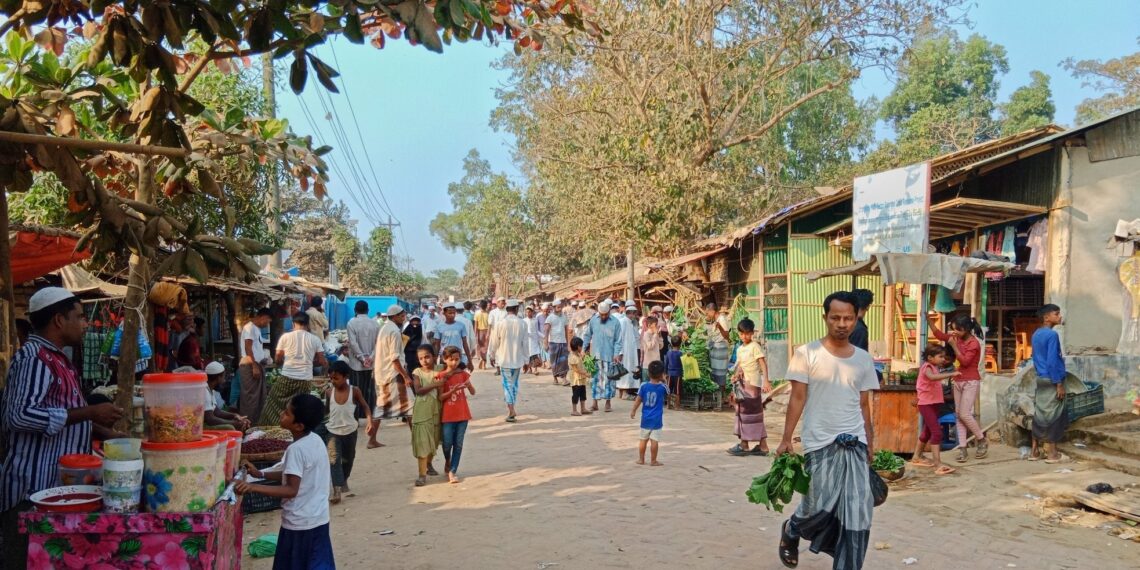Even as Bangladeshi senior officials, including National Security Adviser (NSA) Khalilur Rahman, prepare to be part of an international meeting in New York next month, thousands of Rohingya refugees living in camps in Bangladesh’s Cox’s Bazar district have formed a new joint front – Rohingya Committee for Peace and Repatriation (RCPR).
Formed a few weeks ago, the RCPR is being said to be receiving “support” and “cooperation” from Arakan Rohingya Salvation Army (ARSA) and the Rohingya Solidarity Organisation (RSO). More importantly, RCPR may soon hold elections to elect an organisational president and other office bearers.
Even as Bangladesh’s interim regime Chief Adviser Mohammad Yunus today left for Cox’s Bazar to hold meetings with key stakeholders in the Rohingya refugee repatriation issue, reports have surfaced of a deadly gunfight between Rohingya Islami Mahaz (RIM) cadres and Arakan Army soldiers at Kyun Pauk Pyu Su in Maungdaw township, Rakhine State, on August 20.
The Arakan Army soldiers are said to have prevailed over the RIM fighters and recovered some arms and ammunition besides some backpacks with the UNICEF logo printed on them.
There are now increasing reports of exchange of gunfire between the Arakan Army and the ARSA and RSO who are reportedly coordinating their actions with clandestine support from the Bangladesh Directorate General of Forces Intelligence (DGFI).
Early this month, Bangladesh’s Chief Adviser was part of a meeting between representatives of a few ASEAN countries in Kuala Lumpur, Malaysia, where a key decision taken was to hold consultations with Myanmar’s military junta regime to evolve ways and means on Rohingya repatriation.
Next month, NSA Khalilur Rahman, who wears a second hat – Bangladesh’s High Representative on the Rohingya Issue – will travel to New York where a meeting has been organised by a Gambian public official on finding effective ways to repatriate the 1.6 million Rohingya refugees living in unhygienic camps in Cox’s Bazar.
The New York meet will be held in the backdrop of the failed attempt by Bangladeshi authorities to operationalise a “humanitarian corridor” who initial objective was the repatriation of Rohingya refugees to their home provinces in Maungdaw and Buthidaung in the Rakhine State.
Earlier, during United Nations Secretary General António Guterres’ visit to Cox’s Bazar in March this year, a hurried plan to set up a “humanitarian corridor” came to nought.
However, Khalilur Rahman persisted with a new tack: he sought the Bangladesh Army’s cooperation to send across humanitarian assistance to the Rakhine State.
But the Bangladesh Army stood a contrary stand, opposing any humanitarian corridor that would negatively impact Bangladesh’s sovereignty.
Northeast News had reported on March 13 about Khalilur Rahman’s New York visit.
At that time, he was to propose a ‘no fly zone’ over the Rakhine State and a safe haven for the Rohingya refugees.
He was to also deliberate on the vexed ‘R2P’ – Right to Protection – issue that has been in circulation for at least four years now, primarily among US-based think tanks and refugee rehabilitation organisations.
Sometime in March this year, Khalilur Rahman attended a conference in Dhaka in which a representative from Gambia made a “compelling” presentation on refugee crisis similar to that Western African country’s experience in the past.
Khalilur Rahman will now have to take into consideration the newly-formed RCPR which will be spearheaded by five to six new Rohingya leaders based out of the US. Dil Mohammad, who took over as ARSA head after Ataullah Abu Ammar Jununi was ‘arrested’ by Bangladeshi authorities in early April this year, has now been effectively sidelined.
Two of these US-based Rohingya leaders are U Shwe Maung aka Abdul Razzak, who served as an MP in the House of Representatives from Buthidaung between 2011 and 2016.
ALSO READ: Meghalaya child rights panel urges CM to adopt humane street dog welfare policy
U Shwe Maung, who is also President of Arakan Institute for Peace and Human Rights (AiPAH), Interim Chairperson of Arakan Rohingya National Congress (ARNC) and a Board Member of the ASEAN Parliamentarians for Human Rights (APHR), is based out of Houston, Texas.
The other new Rohingya leader is Tun Khin, who is the president of the Burna Rohingya Organisation, UK.
Some reports indicate that elections will be held to pick the RCPR leadership. These elections will be held in phases. In the first phase, several Rohingya will be selected from each camp to elect a leader.
The objective is to elect leaders for all the 33 camps in Cox’s Bazar.
These 33 camp leaders will elect a president. The election process will be in the control and command of the DGFI.















